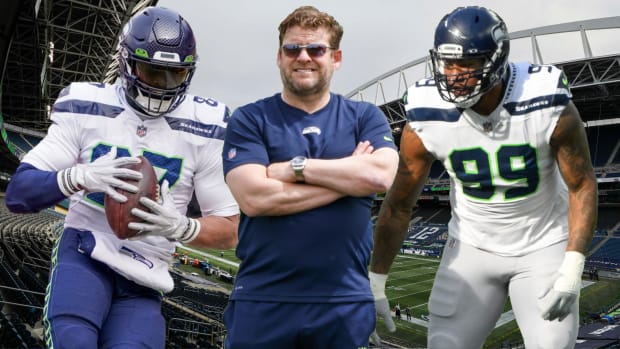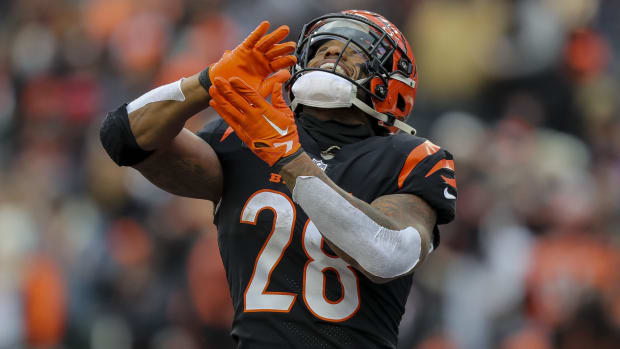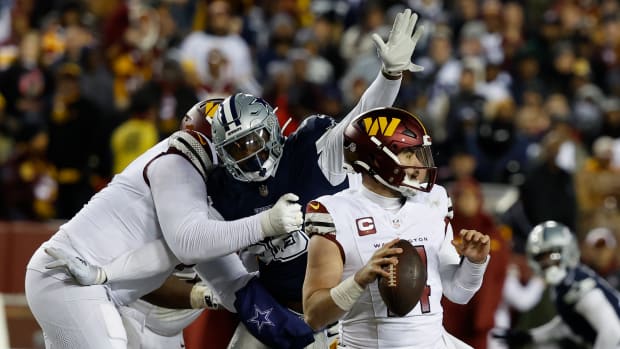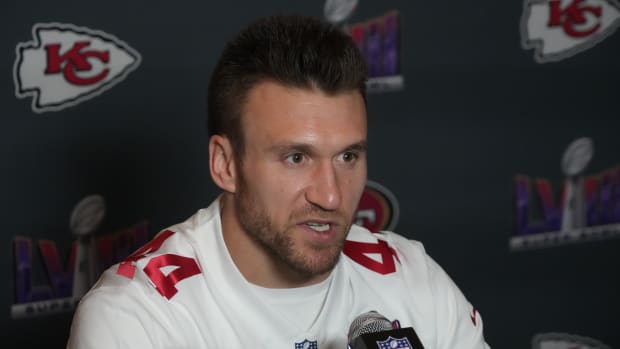They Complete Us
Jerry Maguire
Peter King, editor-in-chief
I really liked Jerry Maguire back in the day—back, I guess, almost two decades ago—but for me to name it my favorite football movie ever says a lot about football movies. Basically, football movies have stunk. It has a lot to do with two things: It's very hard to simulate a real football game up on the big screen. And I've covered football for 30 years now, so I can sniff out a fake pretty easily. But there was something about Jerry Maguire that appealed to me. Two things, really. They had the agent thing down pat. Tom Cruise plays a good desperado agent. I was convinced he could act after seeing him desperately mine for phone numbers and contacts after being divorced from his big agency. That desperation, I knew, is what an agent shunned from his group would display. Two: the Rod Tidwell character, played by Cuba Gooding Jr., actually reminded me of Michael Irvin. Street smart, very funny, talented, and hugely concerned with The Next Contract. That’s what so many players try to hide, but it looked real to me. "SHOW ME THE MONEY!!!!'' is clearly the best line in football movie history, and Gooding deserved the Oscar he won for Best Supporting Actor. Because he was the best at playing a football player, on and off the field, that I've seen.
Show him the you-know-what. (TriStar Pictures/Courtesy Everett Collection)
Jerry Maguire
Jenny Vrentas, staff writer
We live in a cynical world. And we work in a business of tough competitors. When Jerry Maguire came out in 1996, I was in seventh grade, and I’m quite certain I had no concept of what this statement actually meant. But I loved the movie for being a window into this high-stakes, complicated, adult world I knew nothing about. (Also, that kid was adorable.) It’s remained a favorite through the years, and now working within the world of professional football, I see the pressures and dilemmas Maguire faces in the movie are not only real, but persistent. His crisis of conscience at the outset, after all, is triggered by the son of a player who asks Maguire, “Shouldn’t somebody get him to stop?” after his father suffers a fourth concussion. As an adult, I think what I like the most is not the way the movie winds toward its satisfying conclusion—Maguire and his top (only) client, Rod Tidwell, learning to value some things more than money—but the realistic portrayal of how getting there can be a messy, lonely, ongoing fight. All that, in a movie centering on a sports agent … go figure!
* * *
Remember the Titans
Greg A. Bedard, senior writer
Yeah, I know it’s a bit corny, and a Disneyfied version of the true story, but I can’t help but watch Remember the Titans every time it’s on TV. The performances of Denzel Washington and Will Patton are so good they make you look past the cringe-inducing parts. (“Na Na Hey Hey Goodbye" at a funeral? Really?) I buy into it all each time I watch: the team dealing with the racism around them, the tough coach trying to get his players to believe, the coaches finally putting their egos aside, the Gary-Julius dynamic, and one of my favorite sports movie sequences. (“I don’t want them to gain another yard!”) What resonates most about Remember the Titans is that we’ve all been on teams that have a broad collection of personalities and backgrounds, but you become a band of brothers during that time—and for the rest of your life. That’s not corny. That’s reality.
Denzel inspires the Titans. (Disney Enterprises, Inc/Photofest)
* * *
Friday Night Lights
Robert Klemko, staff writer
There’s not enough written about the way longform visual media transformed how we think about football. The work of NFL Films and several motion picture companies over the last several decades breathed life into a previously inaccessible sport, foreign in so many ways to everybody out there who found little romance in its violence. By high school I was no longer a member of the uninitiated, but I can remember a few television shows and movies that enhanced my interest in the game, foremost among them Friday Night Lights, when it came out as a movie in 2004. I was 17 when six of us, varsity members of our suburban Maryland high school football team, squeezed into a Volvo to drive to see the movie. Somebody was freshly 18 and bought a can of long-cut wintergreen Skoal for everybody to try for the first time. Right around the part where Boobie Miles tells his teammates how black and beautiful he is, a couple of us sprinted into the hallway to spit up our dip and the rest of our stomach contents. We collected ourselves and re-entered the universe of Texas high school football and stoic quarterbacks and abusive football dads and morally-compromised head coaches. Their lives became our fantasy; we wondered if we could play football like that, at such a high level, and in front of so many people who cared. We never did, but that mesmerizing score, expertly laid down by Texas instrumental post-rock band Explosions in the Sky, still brings me back to that evening at the theater, and to those days when our biggest concern was the scoreboard at the end of Friday night.
Billy Bob Thornton as the coach, pre-TV. (Ralph Nelson/Universal Studios)
* * *
Little Giants
Andy Benoit, contributing writer
Hollywood can’t make football more entertaining than it already is. The less actual football that’s involved with a football movie, the better the movie. This raises a philosophical question: should a movie like this even be considered a “football movie?” Rudy or Remember the Titans told stories that were about so much more than the sport. Calling them football movies feels a little like calling Titanic a “nautical movie.”
By that standard, a true football movie can only be “good” not “great,” and even getting to “good” is difficult because at this point it becomes in the eye of the beholder. What matters is where you are in life when you see the movie.
I was in second grade when Little Giants came out. I enjoyed that movie almost as much as I’ve enjoyed any movie since. What I liked most were the alternate uniforms. Keep in mind, in October of ’94 the NFL had not fully gotten into allowing teams to wear a third set of pants or jerseys in the same season. Seeing the Giants uniform with a red jersey was awesome. Even more awesome—or to be true to the time, “awesomer”—was seeing the Cowboys uniform with blue pants. Blue pants! And it wasn’t the Cowboys’ boring old plain white jerseys with blue pants; it was their double-star jerseys, which I’m convinced were designed specifically for enrapturing 8-year-olds. Little Giants also had the perfect trick for a children’s football movie: cameos. Spoiler alert: Just when it seems that Rick Moranis (one of Hollywood’s great wimpy actors) and his team of outcasts is at the end of their withered, pathetic rope, John Madden’s bus stops by because the coach-turned-broadcaster-turned-mogul is lost. Even better: Madden just happens to have with him Emmitt Smith, Bruce Smith, Tim Brown and Steve Emtman (now forgotten but at the time two years removed from being the second overall pick in the draft). The arrival of those stars inspires Moranis’s players—and thrilled at least one budding NFL fan.
* * *
Rudy
Matt Gagne, editor
In what other film does a no-name, no-talent, no-business-being-there excuse for a defensive lineman get serenaded by a slow-clap for showing up late to the final practice of his college career? Then to actually get on the field and play for the Irish? I mean, you’d have to hate the movie if it weren’t based on a true story—and still some people have an aversion to its maudlin overtones. But as a former high school defensive back who made varsity for only one season, I have a soft spot for no-name, no-talent, no-business-being-there little guys who come up big. (Who has two thumbs and earned All-State Honorable Mention as a senior? This guy! So what if it was in New Hampshire?) I met the real-life Rudy Ruettiger when he came to visit my middle school in the mid-1990s, and I was that little annoying kid who wore a Notre Dame jersey to the assembly. Once I got over the fact that the real Rudy looks nothing like Sean Astin, I had my picture taken with him and got his autograph—only one of two I’ve ever asked for in my life. The signed baseball card by Red Sox pitcher Dennis Lamp is rotting in a trash bag somewhere. The index card on which Rudy signed his name is sitting on a bookshelf, framed, in my apartment in the Bronx.
Editor Gagne’s greatest wish. (Photofest)
* * *
North Dallas Forty
Mark Mravic, editor
Count me as another one who typically finds sports movies tough to swallow. Nothing Hollywood can concoct is as real and visceral as the true-life drama of actual athletic competition. (That’s why the best sports movie you’ll ever see is Hoop Dreams, the brilliant documentary about two Chicago high school basketball players.) The most affecting sports movies are almost always based on true stories: Hoosiers, Raging Bull, Brian’s Song. North Dallas Forty, from former Dallas Cowboys receiver Peter Gent’s semi-autobiographical novel, isn’t as good as those, but it succeeds better than most fictional films in giving us a believable look behind the curtains of an NFL team.
Nick Nolte is slow getting up as a "North Dallas Bull." (Paramount)
From the opening scene, in which a battered and disheveled Nick Nolte wakes up on a blood-soaked pillow next to a nightstand strewn with empty beer cans and painkiller bottles, drags his scarred and creaking body to the kitchen to knock back a pill and wash it down with a warm beer, pulls a bloody cotton ball out of his nose with a pair of tweezers, then slides into the bathtub and lights up a joint, you knew this wasn’t Knute Rockne: All American. Nolte’s an aging, jaded receiver trying to hang on, Mac Davis is the Don Meredith-like good ol’ boy quarterback, and the great character actor G.D. Spradlin is letter-perfect as the Tom Landryesque coach, right down to the hat. There’s a venal, smarmy owner; a GM desperate to undermine Nolte (who’s sleeping with his wife); drinking and drugs; fights and foul language; some decent football action; and outrageous ’70s clothes and hairstyles. But what’s best about North Dallas Forty is how it conveys the chasm between the players on the one hand and coaches and management on the other. The movie’s most famous line is delivered by John Matuzsak—poignantly, in that the onetime Raiders wildman would OD on prescription painkillers at age 38—to assistant coach Charles Durning: “Every time I call it a game, you call it a business, and every time I call it a business you call it a game.” More apt may be the scene in which a clueless chaplain asks God to bestow his blessing on “these brave boys as they venture out” for the championship game, and as he concludes, Matuzsak bellows,“Let’s go kill those c----------!” That’s football for you.
What did we forget (besides "Horse Feathers") ? Tell us your favorite football film, and why, in the comments section below.












































